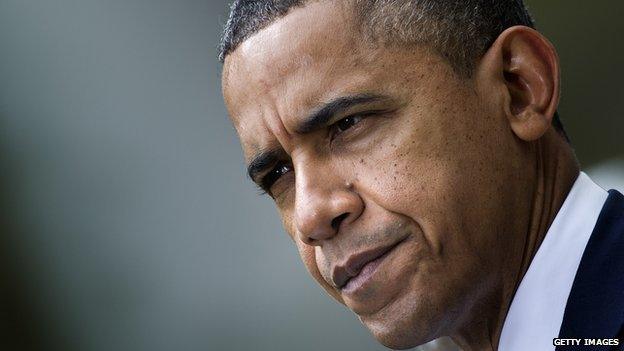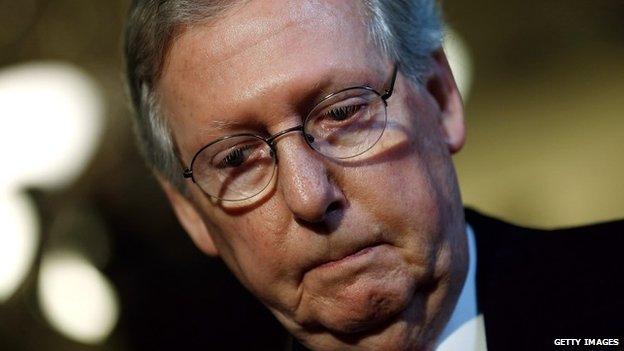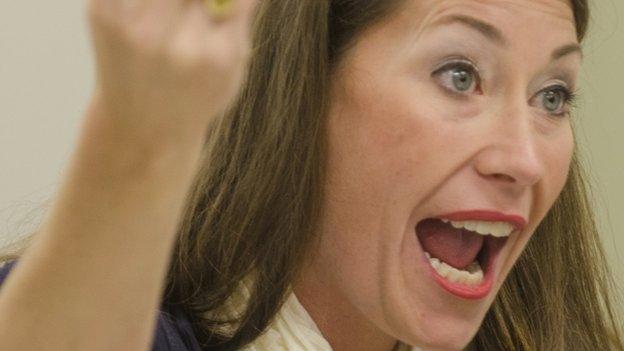Will the US mid-term elections change anything?
- Published

There are two stories running big in the United States at the moment - the mid-term elections and Ebola. For Barack Obama, it is as though the two have become horribly confused.
For it seems all the Democratic Party hopefuls fighting in the key Senate seats tomorrow are treating him as though he were infected by Ebola.
That is to say they want Mr Obama to go through the 21-day quarantine that health workers from West Africa are undergoing. In a sealed tent, somewhere in the White House. And nowhere near their states.
He is being kept away from the key swing states. When he has turned up, some candidates have cited "scheduling difficulties" or "diary confusion" to explain why they didn't meet him.
In Kentucky, the candidate Alison Lundergan Grimes gave a hilarious interview to her local newspaper. She wouldn't even answer the question: "Who did you vote for in 2008 and 2012?"

Senate Republicans, led by Mitch McConnell, hope to take over the chamber
She was petrified to say those four words, "I voted for Obama." Here is a flavour of it:
Q: Did you vote for President Obama, 2008, 2012?
ALG: You know, this election isn't about the president. It's about, you know, making sure we put Kentuckians back to work, and...
Q: (Interruption) I know, did you vote for him?
ALG: I was actually an '08 delegate for Hillary Clinton and I think Kentuckians know I'm a Clinton Democrat through and through. I respect the sanctity of the ballot box and I know that the members of this editorial board do as well.
Q: So you're not going to answer.
It went on and on in that vein.
It is as though the man who in 2008 was seen to have the touch of King Midas - the man who could turn base metal into 24-carat gold - can now only turn things into dross.
So Democratic candidates are stressing their local credentials, while their Republican opponents have gone to great lengths to calculate just how often the senator has voted for Obama proposals.
Senator Jeanne Shaheen in New Hampshire stands accused of voting 99% of the time in support of the president. For Mark Begich in Alaska it's 97% of the time. Loyalty to the president is now a stick with which to beat a Democrat. And whack him or her pretty damn hard.

Obama's approval ratings
An ABC News/Washington Post poll suggested, external 44% of people see President Obama favourably, down from 49% January and 60% as his second term began
The survey also indicated that half of adults and 53% of likely voters view him unfavourably
This is close to an all-time personal low, according to Real Clear Politics, external
Bill Clinton, Ronald Reagan and Dwight Eisenhower all had higher approval ratings at this stage of their presidencies, according to Gallup, external, but George W Bush's figures were slightly lower

It's always interesting at election time in politics to ask the question - are people voting for the person they want the most, or the candidate they mind the least?
If it is the former, it is normally a good guide that turnout will be high - think Narendra Modi earlier this year in India or Obama in 2008, or Tony Blair in Britain in 1997. Those were "time for change" elections.
In the United States at the moment the mood is sullen, which occasionally tips into anger. It is a plague-on-both-your-parties election.
In truth, there is not much love for the Republicans either. I spent the day at Churchill Downs, the wonderful racecourse where the Kentucky Derby is run. And from across America people had gathered in Louisville for a convention of young agricultural students, 66,000 of them and their teachers.

Alison Lundergan Grimes failed to disclose whether she voted for Obama as president
I spoke to Democrats and Republicans and they all said the same thing - they were sick of the partisan posturing, the gridlock, the inability to work together, the dysfunctional relationship between Congress and White House, between legislature and executive.
All of which begs the question - what difference will it make if the Republicans do take control of the Senate tomorrow?
Some are predicting that it will be gridlock on steroids. In other words, just like before - only worse.
Others, who've clearly read Voltaire's Candide and based their philosophy on the ever-optimistic Dr Pangloss, think we will go to the sunny uplands of politics.
The president, keen to make something of his final two years in office, will tack to the centre, where he will find an accommodating Republican Party wanting to get things done in the interests of the United States - and on the economy, tax reform, and immigration they will put aside some of their differences, they will compromise and carve a path toward progress.
Well maybe. I have written it flippantly, but it is - at a stretch - just about possible. The Republicans will be looking at the presidential elections in 2016, and it is not a great campaign slogan to say "we controlled both houses, and got nothing done". And the same pressure will be on the president.
And who knows, with the passage of time, his party might allow him out of quarantine and rehabilitate him back into the community.
- Published29 April 2014